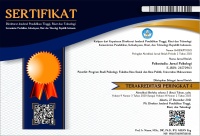Financial Self-Efficacy Dan Sikap Terhadap Utang Pada Dewasa Awal
Abstract
Keywords
Full Text:
PDFReferences
Bank Indonesia. (2014, 10). Dipetik 8 20, 2019, dari https://www.bi.go.id/id/ruang-media/siaran-pers/Pages/sp_166914.aspx
Bank Indonesia. (2019). POSISI PINJAMAN/KREDIT KONSUMSI YANG DIBERIKAN BANK UMUM DAN BPR. Jakarta.
Bank Indonesia. (2019). Transaksi Kartu Kredit. Jakarta.
Beale, E. M., & Cude, B. J. (2017, December). College Students' Attitudes toward Debt. International Journal of Undergraduate Research and Creative, 1-10. doi:https://doi.org/10.7710/2168-0620.1099
Davies, E., & Lea, S. E. (1995, December). Student attitudes to student debt. Journal of Economic Psychology, 16(4), 663-679. doi:https://doi.org/10.1016/0167-4870(96)80014-6
Farell, L., Fry, T. R., & Risse, L. (2015). The significance of financial self-efficacy in explaining women’s personal finance. Journal of Economic Psychology, 1-43. doi:http://dx.doi.org/10.1016/j.joep.
Gravetter, F. J., & Forzano, L.-A. B. (2012). Research methods for the behavioral sciences (4 ed.). Belmont: Wadsworth Cengage Learning.
Lapp, W. M. (2010). The Missing Link: Financial Self-Efficacy’s Critical Role in Financial Capability. San Fransisco: Earn Research Institute. Diambil kembali dari http://www.earn.org/static/uploads/files/Missing_Link_Financial_Self-Efficacy_Critical_Role_in_Financial_Capability.pdf
Lown, J. M. (2011). 2011 Outstanding AFCPE® Conference Paper: Development and Validation of a Financial Self-Efficacy Scale. Journal of Financial Counseling and Planning, 22(2), 54-63. Retrieved from https://papers.ssrn.com/sol3/papers.cfm?abstract_id=2001554#
Lusardi, A., & Tufano, P. (2015, October). DEBT LITERACY, FINANCIAL EXPERIENCES, AND OVERINDEBTEDNESS. ournal of Pension Economics and Finance, 14(04), 332-368. doi:10.3386/w14808
Mariott, P. (2007, October). An Analysis of First Experience Students' Financial Awareness and Attitude to Debt in a Post-1992 UK University. Higher Education Quarterly, 61(4), 498-519. doi:10.1111/j.1468-2273.2007.00369.x
Norvilitis, J. M., & Mao, Y. (2013). Attitudes towards credit and finances among college students in China and the United States. International Journal of Psychology, 48(3), 389-398. doi:http://dx.doi.org/10.1080/00207594.2011.645486
Nurbaya. (2018, Mei 4). Merdeka. Diambil kembali dari https://www.merdeka.com/uang/profesor-dari-jerman-prediksi-pada-2050-ekonomi-indonesia-jadi-raksasa-dunia.html
Papalia, D. E., Feldman, R. D., & Martorell, G. (2012). Experience human development (12 ed.). New York: McGraw-Hill Education.
PricewaterhouseCoopers. (2017). The Long View: How Will The Global Economic Order Change by 2050? London: PwC. Diambil kembali dari https://www.pwc.com/gx/en/world-2050/assets/pwc-world-in-2050-summary-report-feb-2017.pdf
Qamar, M. A., Khemta, M. A., & Jamil, H. (2016, January). How Knowledge and Financial Self-Efficacy Moderate the Relationship between Money Attitudes and Personal Financial Management Behavior. European Online Journal of Natural and Social Science, 296-308. Diambil kembali dari http://european-science.com/eojnss/article/view/3234/pdf
Remund, D. L. (2010, Juni 1). Financial literacy Explicated: The Case for a Clearer Definition in an Increasingly Complex Economy. The Journal Of Consumer Affairs, 4(2), 276-295. doi:https://doi.org/10.1111/j.1745-6606.2010.01169.x
Sarwono, J. (2011). Mixed Methods: Cara menggabung riset kuantitatif dan kualitatif secara benar. Jakarta: PT. Elex Media Komputindo.
Shohib, M. (2015, January 1). SIKAP TERHADAP UANG DAN PERILAKU BERHUTANG. Jurnal Ilmiah Psikologi Terapan, 3(1), 132-143. doi:https://doi.org/10.22219/jipt.v3i1.2133
Stajkovic, A. (2006, December). Development of a core confidence-higher order construct. Journal of Applied Psychology, 91(6), 1208-1224. doi:10.1037/0021-9010.91.6.1208.
DOI: http://dx.doi.org/10.30872/psikostudia.v8i2.3045
Refbacks
- There are currently no refbacks.
Copyright (c) 2019 Psikostudia : Jurnal Psikologi

This work is licensed under a Creative Commons Attribution-ShareAlike 4.0 International License.
Indexing by :
_________________________________________
PSIKOSTUDIA: Jurnal Psikologi Published by Faculty of Social and Political Siences, University of Mulawarman, Samarinda, East Kalimantan and This work is licensed under a Creative Commons Attribution-ShareAlike 4.0 International License.
_________________________________________
PSIKOSTUDIA: Jurnal Psikologi
Department of Psychology
Faculty of Social and Political Siences, University of Mulawarman
Jl. Muara Muntai Kampus Gn. Kelua Samarinda 75411
Phone: +62 813 35350368
E-Mail: psikostudia@fisip.unmul.ac.id




















